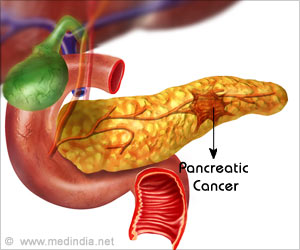- It is difficult to distinguish between cancerous and non-cancerous variants of pancreatic cysts
- Two tests that assess the level of proteins VEGF-A and CEA have been found to be good indicators of cysts that are not cancerous
- These tests are potential biomarkers and can be used to limit the need for invasive diagnostic procedures
- 2-3% of patients get detected with pancreatic lesions on a routine abdominal scan.
- The 5 year survival rate of these patients is
- 12-14% for those with early stage disease
- 1-3% for those with advanced stage of disease
- A small percentage of these patients detected with pancreatic lesion would have serious cystic neoplasms (SCN). These are non-malignant and do not develop into cancer.
Potential Diagnostic Testing
The study by the research team from Indiana University has found that two proteins play an important role in determining if the lesions are pre-cancerous or cancerous.
- Vascular endothelial growth factor A (VEGF-A) is a protein that is found to be involved in the formation of new blood vessels. This protein’s expression is increased in many different types of tumors and the research team from Indiana University has used this protein in its diagnostic test.
- Carcinoembryonic antigen (CEA) is a protein that is found to be involved in cell adhesion. This protein, while being present in low levels in healthy individuals, is found in increased levels in individuals with certain types of cancer.
The level of these proteins is tested in pancreatic cyst fluid and the results of the findings are:
- Accurate identification of serious cystic neoplasm (SCN) from other types of pancreatic lesions.
- The levels of VEGF-A independently identified serious cystic neoplasms with a specificity of 83.7% and a sensitivity of 100%.
- The levels of CEA independently identified serious cystic neoplasms with a specificity of 81.5% and a sensitivity of 95.5 %.
- When the tests for the proteins were taken together, they reached the gold standard of pathologic testing. The combined specificity was 100% while sensitivity was 95.5%.
- In the study, the research team found that 26 patients could have been prevented from opting for surgery.
Developing a Diagnostic Technique:
- Out of these, 26 participants had serious cystic neoplasm
- Pathological examinations were used to confirm the diagnosis
Further research studies are required to confirm the accuracy of the VEGF-A and CEA levels and the risk of developing pancreatic cancer.
There are many ongoing research studies being carried out to identify biological markers for pancreatic cancer. The current study focuses on differentiating between cysts that will not develop into cancer and cysts that would. This will help in reducing the number of people who would require invasive surgical procedures.
References:
- Treatment & Support - (https://www.cancer.org/treatment.html)
- Rosalie A. Carr, Michele T. Yip-Schneider, Scott Dolejs, Bradley A. Hancock, Huangbing Wu, Milan Radovich, C. Max Schmidt. Pancreatic Cyst Fluid Vascular Endothelial Growth Factor A and Carcinoembryonic Antigen: A Highly Accurate Test for the Diagnosis of Serous Cystic Neoplasm. Journal of the American College of Surgeons, 2017; 225 (1): 93 DOI: 10.1016/j.jamcollsurg.2017.05.003
- General Information About Pancreatic Cancer - (https://www.cancer.gov/types/pancreatic/patient/pancreatic-treatment-pdq)













